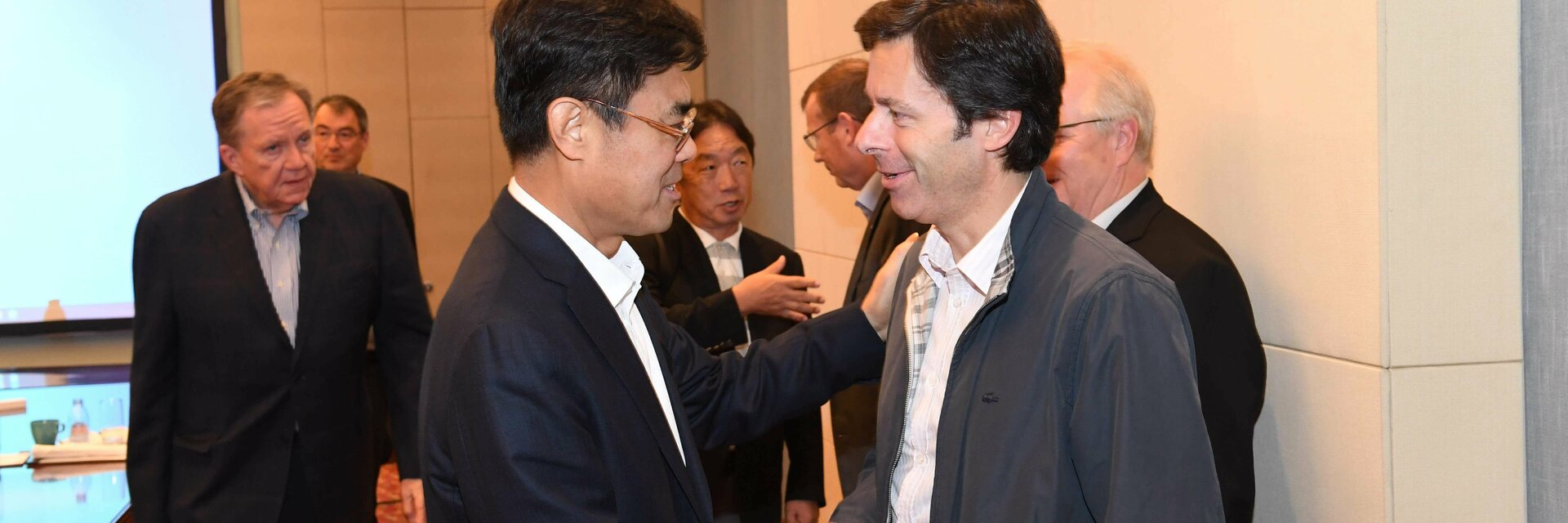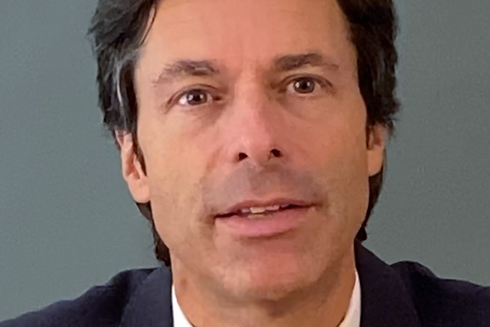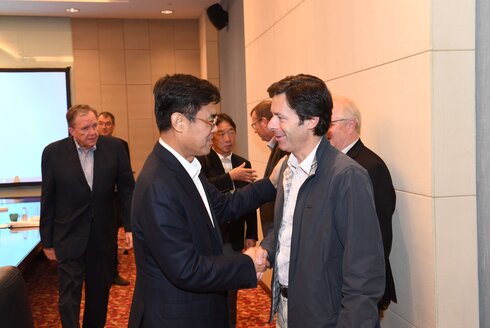IEC-Generalsekretär Philippe Metzger im Interview mit dem OVE
Taking stock – one year at the IEC
Interview with Philippe Metzger, IEC General Secretary & CEO
OVE:What plans and ideas for your first year in the IEC could not be put into action and why?
Philippe Metzger: I would like to thank you for this opportunity to share my impressions and thoughts. Austria is an important and very active member of the IEC and I hope we will soon be able to have regular face-to-face meetings once travel is again possible and I look forward to meeting you in Vienna at the OVE Innovation Day in November.
Despite Covid-19, I am happy to say that many of my plans played out. One of my first priorities was to optimize the internal management structure at IEC CO which was too complex, with too many people reporting directly to me. This was completed by October 2020 and helped increase efficiency and cross-departmental cooperation. We also successfully initiated the IEC governance review and the Task Force which I am serving as secretary is now proposing new IEC Statutes & Rules of Procedure that would notably clarify and enhance the interaction and responsibility of the different IEC governing and advisory bodies. In this context, we also realized that we have to engage with a larger group of stakeholders and that we need to enable a higher level of engagement by all our Members.
One of my key objectives for 2020 was to get to know all IEC Members personally. Unfortunately, this had to be postponed as travel remains largely impossible.
So, while I was not able to meet and greet people as much as I hoped during the past year, I feel that I have fully arrived at the IEC and I am thoroughly enjoying the daily interactions with all the stakeholders.
OVE:What do you expect as a “new normal” once we have overcome the pandemic?
Metzger: I expect that many changes that have come our way during the pandemic will remain. I see us adopt a mixed form of work, with hybrid, virtual and face-to-face encounters existing side-by-side in our standardization and conformity assessment work, and at IEC CO. I believe the new mix of home and in-office work is there to stay. Over the coming months, a key focus will be for us to upgrade and digitalize IEC CO internal processes to give ourselves the necessary tools to handle the challenges of the future.
Clearly, we will again travel for business, especially in 2022 to catch up with the lack of personal encounters since the global pandemic broke. Also, in some contexts working online lacks dimensions which are important for innovation and for fostering consensus-building. But many interactions will move to the online space because that is more efficient, as we have learned since March 2020.
OVE: Apart from the crisis which issues in the world of electrotechnical standardization were unexpected/surprising for you?
Metzger: I was truly impressed by the incredible network of over 20’000 people who contribute to IEC with their know-how and expertise with great enthusiasm and focus. Their continued participation is indispensable to allow the IEC to play a foundational role in building a more sustainable and digital world.
I was also heartened to experience how the IEC machinery managed to maintain business continuity and the fact that most of the important processes related to standardization and conformity assessment were already happening online. Taking stock, I can say that the IEC was able to weather the pandemic well, is in very good financial shape, and showed a high level of resilience and flexibility during this unprecedented year.
The governance review is another important lesson learned. It demonstrates that, while Members may have different priorities and sometimes diverging views about fundamental aspects of the IEC, they rally together in the end to find good compromise solutions. The personal engagement and perseverance of the members of the IEC Governance Review Task Force IGTF under the leadership of our President Dr Shu have been outstanding. To me, this is a strong sign of the vitality of, and the commitment to, the IEC which stands our unique association in good stead in view of the many challenges and opportunities ahead of us.
What came as a surprise to me was how many processes in IEC CO were still done manually. While standardization and conformity assessment work has been done online since many years, there is a need for a digital backbone at the IEC CO. Therefore, bringing IEC CO operations into the digital age is a strong focus for me and my team. We are currently designing and implementing a state-of-the-art enterprise resource planning system (ERP). This will allow us to automate more of our internal procedures. In this context we are also critically reviewing how we do things and where we can be more efficient.
OVE: How do you see the world of electrotechnical standardization after your first year? Does everything meet your expectations?
Metzger:Having held several positions in technology areas, both in industry and in the public sector, the last 20 years or so, I understood the key role of standardization before starting at the IEC. However, at the IEC I discovered first-hand the broader relevance of our work for global economic and social development. If, as an organization, we have the vision and the means to exploit that potential to its fullest extent, our work can have a huge impact on how technologies develop in the future for humanity. For this to happen, we need to find ways to collaborate more closely among ourselves. We can do more to leverage the excellent technical work that our experts do day after day to better meet the needs of the multistakeholder world that we are living in today. As an organization we need to focus more on the bigger picture to overcome our somewhat technical siloes.
OVE: How do you see the role and influence of small NCs now and in the future?
Metzger: The IEC is a bottom-up member-based organization with the principle of one vote per member; the sum of all IEC Members forms the IEC. I strongly believe that smaller NCs will very much benefit from the emerging new governance structure, which will hopefully be adopted at the GM in October. It is designed to strengthen the involvement of every member, including smaller ones. I hope that IEC Members will increasingly participate in a shared vision that allows us all to move forward together and address key economic and societal topics as well as relevant technical solutions. However, this will require a constant willingness for compromise, with the bigger picture in mind. And we are certainly doing our utmost at the Central Office to ensure that smaller NCs are not left behind.
OVE: To what extent and how will new emerging topics (like AI, Smart Cities, Robotics (and Ethics) etc.) affect the IEC in the future (e.g. in relation to other SDOs)?
Metzger:In electrotechnology, the speed of innovation has accelerated to a point where no individual company or organization can develop everything alone. And while companies are fiercely competitive, they must now collaborate more than ever to deliver the broad solutions for increasingly complex systems. In this context, IEC, ISO and ITU closely cooperate to avoid contradictions in standards and ensure compatibility between different standards whenever possible, including in new technology areas. We are for example closely cooperating with ISO on SMART Standards, which open a new era in digitalization.
While collaboration between IEC and ISO has been effective for a very long time given that we have in common many members and most of our Directives, we have also taken several initiatives to increase the cooperation with ITU. We have put in place cross-cutting joint initiatives such as the World Standards Cooperation (WSC), the Strategic Programme Coordination Group (SPCG), the Climate Change Coordinating Committee (CCCC), or the Smart City Strategic Task Force, to name just a few. We are also a founding member of OCEANIS, which was initiated by IEEE and which explores AI ethics. AI is a particularly salient case in hand for an emerging topic to which the IEC needs, and can, contribute more going forward due to the pervasiveness of the challenges and opportunities at stake. In fact, finding appropriate approaches to the governance of AI poses some of the more fundamental questions of our era. Involving IEC in the elaboration of the right answers even more than today goes to the core of our mission.
OVE: What would you consider being your most critical target at IEC to being implemented/realized in 2021?
Metzger: In 2021 we are hoping to see our Members approve a new governance system in the shape of new IEC Statutes & Rules of Procedure at this year’s General Meeting. Just as important, we have also started the development of the future IEC Strategy as we are approaching the third year of the implementation of the current IEC Masterplan. The Strategic Plan Task Force (SPTF) under the leadership of our Treasurer Jo Cops is aiming at a strategy that looks at the shorter- and longer-term outlook for IEC and that can yet constantly evolve to remain relevant for many years to come. This is of crucial importance to ensure the future relevance of the IEC. The task force has the ambitious goal to finalize the new strategy by end 2021 and it is of course consulting and involving all the IEC Members and leading entities on the way.
The IEC is also embracing digitalization both in terms of the products we develop and the way in which they are developed. At the level of the standards development process, the IEC is currently implementing new tools and agile processes to deliver more data centric standards. These include for example online authoring (like the Fonto project), the digitalization of working methods both in standardization and in conformity assessment, as well as activities led by the SMB in the areas of agile standardization and new ways of working.
At the level of the standards formats, we are collaborating with ISO to explore the area of machine readable and interpretable standards, also referred to as SMART (Machine Applicable, Readable and Transferable) standards. Both IEC (through SMB/SG 12) and ISO already have ongoing technical activities in this field. However, this new way of developing and distributing standards will have an impact far beyond the technical aspects, including commercial and legal considerations. This will lead in the future to fundamentally new ways of working in both organizations.
OVE: Thank you for this interview, Philippe Metzger.
Metzger:You are very welcome, my pleasure.
About:
A lawyer by training, Philippe Metzger became IEC General Secretary & CEO on 1 February 2020, shortly before the global pandemic hit. He joined the IEC following 6 years at the helm of the Swiss Federal Office of Communications OFCOM, having previously also held senior positions at the International Telecommunication Union (ITU) and the European Free Trade Association (EFTA), and having served as Senior Corporate Counsel of a US multinational IT corporation with EU headquarters in Amsterdam.


